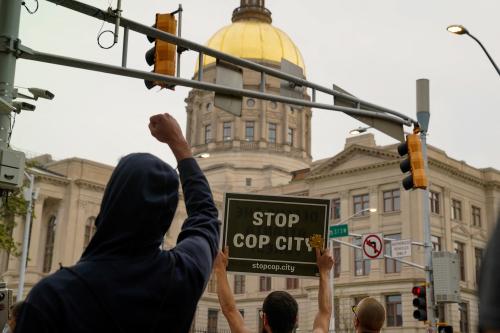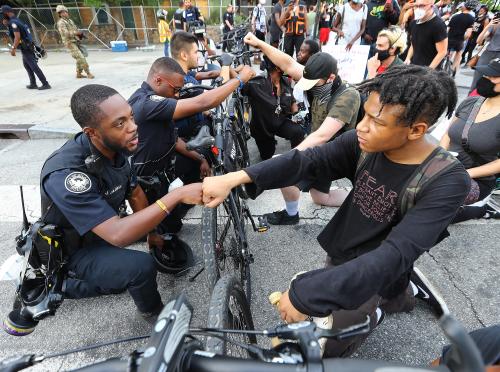Will the guilty verdict for Derek Chauvin’s murder of George Floyd be just a single blip of accountability in the longer history of police violence, or will it be a real inflection point to galvanize change? Rashawn Ray speaks to the significance of Chauvin’s trial, the fractured state of police-community relations, and what the Department of Justice needs to ensure real accountability.
Related material:
- Will the Derek Chauvin conviction for murdering George Floyd change policing?
- Where would racial progress in policing be without camera phones?
- Why police department insurances are the key to progress on police reform
Listen to Brookings podcasts here, on Apple or on Google podcasts, send email feedback to [email protected], and follow us at @policypodcasts on Twitter.
Thanks to audio producer Gaston Reboredo, Chris McKenna, Fred Dews, Marie Wilken, and Camilo Ramirez for their support.
TRANSCRIPT
PITA: The trial of police officer Derek Chauvin for the murder of George Floyd has resulted in a guilty verdict on all three counts of second-degree unintentional murder, third-degree murder, and second-degree manslaughter.
Here to talk with us about the outcome of this trial and whether or how it will influence policy debates on reforming and transforming policing and criminal justice is Rashawn Ray, David M. Rubenstein Fellow in Governance Studies; Professor of Sociology at the University of Maryland. Rashawn, thanks for being back on the show again.
RAY: Thanks for having me. I look forward to the conversation.
PITA: I want to start looking at the trial itself. One of the prosecutions major messages throughout the trial was to say to the jury, “believe your own eyes,” speaking of course about Darnella Frazier’s video footage, whereas the defense evoked the usual racist stereotypes about Black men in particular and common societal assumption about police officers generally operating in good faith. Was this video really the swaying element for the jury? That the specifics of this instance simply could not be denied, enough that that overcame a lot of the usual cultural hangups?
RAY: I mean, it was definitely significant. Probably the most significant piece of the case, yes. And not only just the video that came from the teenager who bravely stood on the corner watching this happening and filmed it the entire time, but also that there was other video footage: body-worn camera footage, footage from the streets. So, there were a myriad of views where people at different positionalities and different perspectives to be able to weigh in on the murder of George Floyd.
However, in addition to the video evidence, there were other key pieces that actually make this case an exemplar but yet and still an outlier. Not only is it not normative to see what we saw, not only the amount of video evidence, but also the fact that the state of Minnesota, under Attorney General Keith Ellison, was able to assemble an all-star prosecution team. That typically does not happen. Often at the city or the county level, they’re overwhelmed and under-resourced trying to handle these types of cases. I think that was significant.
I think the other thing that was significant is it was a racially diverse jury. Now that racially diverse jury is not set up to overly prosecute law enforcement; instead it’s to tip the scale to make things more equitable, transparent, and accountable. Research documents that, that the more racially diverse juries, the more likely that outcomes across racial groups – people committing the same crimes – is more likely to happen. We have to remember, just recently, over the past few years, there was another officer, a black officer, actually, a Muslim officer, who killed a white woman, a middle-class white woman, and he was found guilty as well. So we’ve had these juxtapositions in that way.
Then of course there were two big things. Not only did we have several medical experts, but we also had a slew of law enforcement officers who testified against Derek Chauvin. This was a slam dunk from the beginning, and yet and still, all of us who saw the ball go in the net were wondering if it was going to count on the scoreboard – and that is what race and racism do in America.
PITA: I want to ask you about that, because it was such a relief, of course, for so many of us, and the thought came into my mind, is it really damning of American society – damning with faint progress — that this murder could be so egregious, and captured on video so clearly, with so many witnesses, including emergency medical personnel, and yet there was still a question in so many of our minds, about whether some measure of justice was going to be mete out?
RAY: I mean, without a doubt. People are mostly viewing Chauvin’s murder conviction as an indictment of policing as a whole, but that’s clearly not the case. The Chauvin verdict was just one killing, but what people actually want is accountability for the entire system. The problem is the court system magnifies the bad apples narrative, oftentimes leading to an over-individualization of the court system, and overwhelmingly lets institutions off the hook. If we just look from the start of the Chauvin trial, over 60 people have been killed by police. In fact, as the verdict was being handed down, there was a 15 or 16-year-old girl in Ohio, who was killed by police in probably an incident that could have been handled in a different way than the level of force that was used on that child.
So what people are recognizing is there are a series of things that have happened. Not just Daunte Wright that was just down the street; or 13-year-old Adam Toledo; or the Army lieutenant in Virginia, people are realizing that the system is fractured. And even though Derek Chauvin was convicted, he was supposed to be convicted. But the reason why people were relieved is because every year in the U.S., over 1000 people are killed by police. And interestingly, only half of these killings are ruled as justifiable, whether that be by the Federal Bureau of Investigation or even by the Department of Justice. And even still, less than 1% of officers are ever charged or convicted. Chauvin doesn’t even make up 10 – he’s in the group of less than 10 officers that have been convicted of murder over the past 15 years. And I think when people look at this collectively, people are realizing that people have been allowed to enact harm and violence on people, and that needs to change.
PITA: This case has very much been a catalyst for a broader public reckoning – particularly among white Americans – with this pervasive nature of police violence and the sense of impunity within so many police units regarding their behavior. Is there a risk that the guilty verdict in this single instance will mute some of this public sense of urgency to make the deep, system-wide changes to policing and criminal justice that are needed?
RAY: Yes, it definitely could. In fact, the national president of the Fraternal Order of Police actually made a statement that said something to the effect that we’re one step closer to getting past this dark day in American history. And I thought about that statement and how it fails to recognize and acknowledge that this isn’t simply just a dark day, but it’s commonplace brutality in many communities around the country, including in primarily Black, low-income communities. So, part of thinking through that is he should have aimed to answer the question that Attorney Ellison stated when he said – essentially he was asking “what is next?” He essentially said that we have to get into a new relationship with society and reexamine use of force. And that new relationship is clearly about police-community relations and how it’s fractured.
And I think the George Floyd Justice in Policing Act, which includes repealing qualified immunity, establishing proper use of force databases, creating a national database of bad apples, that these sort of changes can be really important to not only hold bad officers accountable, but to also protect good officers from those bad officers internally. Because, look, people talk about the blue wall of silence all the time, but the blue wall of silence is not just there because people want to be loyal; it’s there because when you try to crack it, there are real consequences to people’s livelihoods for doing so. Officers are oftentimes, what I call, pushed down and pushed out, meaning they’re more likely to be demoted, they’re more likely to be transferred out, more likely to be stigmatized, and they’re more likely to burn out. And some of these good officers, these good apples, if you will, are the ones who should be becoming police chiefs, who should be running police departments, and instead, they have oftentimes become spoiled or poisoned by these bad apples that are rotting the tree.
PITA: I want to come back to that question of the policies in just a moment, but first I want to ask you about the social influence of this verdict. You mentioned the cases of Ma’khia Bryant in Columbus, Ohio, Adam Toledo in Chicago, and several other instances of people being killed through police violence that were just in the last week, week and a half. Do you see the actions of this jury, this verdict from them, possibly being a tipping point for other juries in the way they’ll look at the prosecution of these or other cases of police violence going forward?
RAY: Well, the past tells us this will simply be a blip. However, if we are to really look at it as an inflection point – and I think that it has been in terms of a racial reckoning in the U.S., which I think we’re in another phase of; in terms of galvanizing policy change – so if we think it’s going to change the courts, what would that look like going forward? First, it’s paying attention to what the judge sentences Derek Chauvin to. A lot of experts, and I tend to agree, legal experts say he’ll probably get around 20 years. For people who have not had any sort of felonious offense often get 12 and a half years; he might end up getting a bit more than that, given that he got hit with three charges. So, people should pay attention to that. People should also pay attention to the other three officers. How are their trials going to go? Are they going to take plea deals? If so, what are those going to look like? So that’s going to be important.
Finally, we need to pay attention to all of these cases that we’re finding out about as well as what I call trickle-down policing, and trickle-down police brutality. The sort of things that rarely make headlines: like what happened to the Army lieutenant. That happens all the time. If he wasn’t an Army lieutenant, and if he wasn’t recording himself, and if he hadn’t filed a civilian lawsuit for $1 million, then we still wouldn’t know about that, because that incident happened months ago. So those are the things people need to pay attention to if it’s about what we’re going to see in the courts.
PITA: In terms of policies, on the legislative and local jurisdictions, as you mentioned, in Congress there’s the George Floyd Justice in Policing Act. U.S. Attorney General Merrick Garland also just announced DOJ will look into policing in the Minneapolis area, reviewing that. Policing is also of course primarily subject to local and state laws and regulations. So, what do you see as the most important next steps either or both federal and local level to make progress on rethinking and reshaping the role and quality of law enforcement?
RAY: So, I think the George Floyd Justice in Policing Act is it. It passed the House of Representatives the first time on what would have been Tamir Rice’s 18-year-old birthday in June 2020. It recently passed again in the House. The Senate needs to bring that up. Democrats are going to have to figure out what they’re going to do; either negotiate a compromise with a group of Republican senators or they’re going to try to bust the filibuster, so to speak. The other thing though, is the Department of Justice, as you talked about. The problem there is the Senate has not confirmed, even voted on some of Biden’s selections. A lot of people find that problematic. A lot of people also think it’s not surprising that these are women of color that have yet to be confirmed.
But when it comes to the Department of Justice, consent decrees are something people should pay attention to. Consent decrees are agreements between the Department of Justice and a municipal police department or a county police department; a local police department. That after an investigation has determined that there are discriminatory practices, practices with policies, with discipline, that deserve oversight. My research has found that those consent decrees oftentimes lead to the most change in police departments. Camden was like this; Baltimore has been under one; Prince George’s county, St. Louis, Ferguson. The list could go on and on, when we look at this. What’s interesting about that is, if we look under Trump, when he was resident, there was zero consent decrees. There were several under Bush; there were slightly more under Obama; and there were zero under Trump. So in the Department of Justice right now there are tons of complaints, not just from civilians, but also from police officers themselves, who are aiming to intervene with officers who engage in egregious forms of misconduct, and aiming to also report discrimination internally, oftentimes from officers of color and women officers based on what they experience, but even white officers oftentimes who are aiming to be good police officers and are put in difficult situations. The Trump administration did nothing about this. I think that the current Department of Justice will aim to do a lot about this. And I think it’s one of the reasons why Biden’s selections are having a difficult time getting the votes.
PITA: All right. Rashawn, thanks again for talking to us today, and we’ll wait and see what happens with the Department of Justice and Congress.
RAY: Thank you for having me.




Commentary
PodcastAfter Chauvin’s conviction, will policing finally change in America?
April 21, 2021